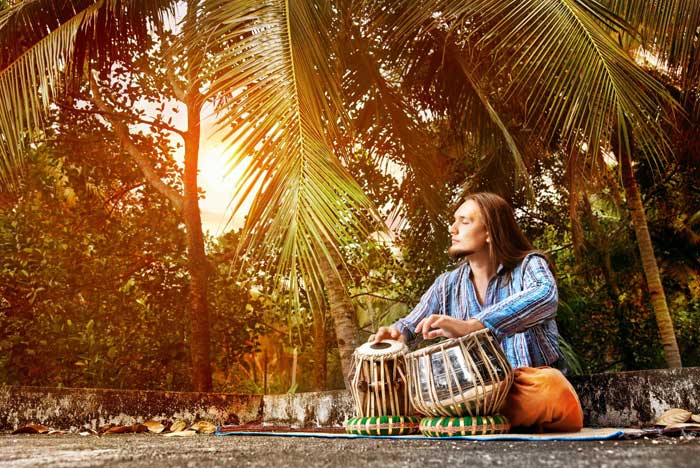You gain from music what you give to it!

I was 4 years old when I sang and played my first notes: “Sa Re Ga Ma Pa Dha Ni Sa”. It didn’t feel like an achievement back then. It was only natural for me being born into a family of singers and musicians. But that marked the beginning of my musical journey. It took me a considerable amount of time to realize the value of what I was learning. My parents told me that one day I would appreciate it and to stick to what I was doing. I was 10 when I realized what an amazing art form I had taken to and ever since I have found that the expanse and depth of Indian classical music seem to be wider than the sky and deeper than the ocean! There’s always something new to learn, some innovation to know of, something to get amazed with or curious about. That was when my true journey began.
My younger sister belonging to Gen-Y embarked upon her musical journey even before the age of 2! As she grows into a fine young lady, I feel proud to see her expand her horizons and feel encouraged to keep up with her enthusiasm to learn more. I may know more about classical music but her energy is what keeps me going to keep discovering new facets of this ancient art form.
A major benefit of starting out young is that we developed a keen sense of tone quality. In simpler words, our ears and brain became sensitive to the quality of voices, pitch and musical sounds. It’s easier to pick out the off-key notes/swars. Believe me when I say that witnessing a laryngitis theme music competition was not a pleasant experience! Jokes apart, for anyone who wishes to pursue music either as a hobby or career, it becomes increasingly important to first tune the ears to tone qualities. Other than having it as an innate ability, it also becomes possible when one is formally trained in classical music. The emphasis laid on singing only with the support of a Drone or Tanpura (musical instrument) enhances the natural understanding of swars for a singer. This is called swargyaan in classical terminology.

Isn’t it easier to write essays and stories once we have mastered the alphabets, spellings, grammar and, at least, a decent level of vocabulary, i.e., when our foundation is set? The same logic applies to learning Indian classical music. If you have swargyaan, you can experiment with any genre of music and instrument. It widens your understanding and knowledge of classical music and helps you appreciate other kinds of music as well. If you can figure out swars, it’s a great help in remembering or reproducing the tune. The best part about Indian classical music is its dynamicity and the immense degrees of freedom. I certainly enjoy playing the guitar and am more receptive towards the nuances of western music because of my classical background. I’m sure you enjoy listening to the Wake Up Sid title track or Desi Girl from Dostana composed by Shankar Mahadevan. Did you know that along with being one of the most popular singers and composers in Bollywood, he is also a classically trained singer and musician? His musical works also include being a part of the fusion jazz band Silk along with other accomplished musicians.
Aside from the musically related benefits of Indian classical music, let me take you through some of the other advantages of learning it.
The greatest bond that we share on planet Earth is unarguably with our parents. And in my sister’s and my case, our parents were our gurus, too. A guru-shishya (teacher-student) relationship is one which requires an emotional connect between the two and also for the shishya to have complete faith in one’s guru. In ancient India, pupils who decided to dedicate their lives to music lived in their guru’s home for the entire learning phase. The process of acquiring vidya (knowledge) and kala (art) was a 24×7 set-up, unlike today’s hourly sessions.
Read the full article by subscribing to the print magazine or the digital edition.
Ashwini Narayangaonkar-Kamath is the eleventh generation of her family to be dedicated to the ancient art form of Indian classical music. She has performed in India and abroad, has music albums to her credit and successfully runs her classical music academy all over Mumbai.
